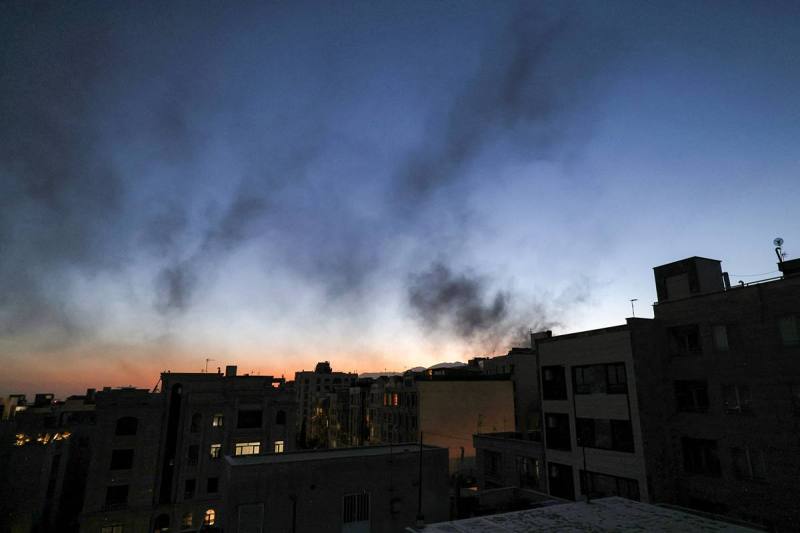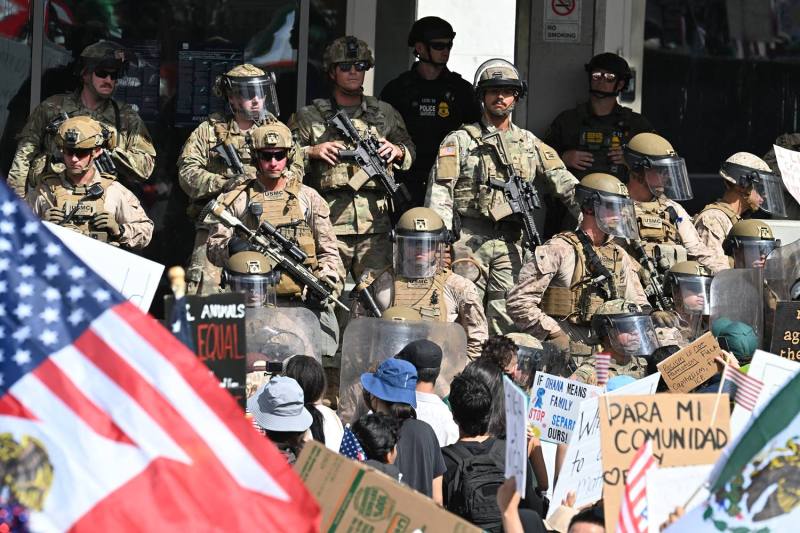Trump Calls for Iran’s ‘Unconditional Surrender’

Trump Calls for Iran’s ‘Unconditional Surrender’
The White House hasn’t ruled out direct U.S. military involvement in Israel’s war with Tehran, worrying lawmakers.
U.S. President Donald Trump talks to reporters on board Air Force One with White House Press Secretary Karoline Leavitt after leaving early from the G-7 leaders’ summit in Alberta, Canada, on June 16. Chip Somodevilla/Getty Images
Welcome back to World Brief, where we’re looking at White House policy on the Israel-Iran conflict, U.S. President Donald Trump skipping the last day of the G-7 summit, and more Palestinians being killed in Gaza while trying to get food aid.
‘UNCONDITIONAL SURRENDER’
As Israeli airstrikes continue to pummel Iran, all eyes are on U.S. President Donald Trump, who is reportedly considering whether to join the Israeli effort and take direct U.S. military action against Iran.
Welcome back to World Brief, where we’re looking at White House policy on the Israel-Iran conflict, U.S. President Donald Trump skipping the last day of the G-7 summit, and more Palestinians being killed in Gaza while trying to get food aid.
‘UNCONDITIONAL SURRENDER’
As Israeli airstrikes continue to pummel Iran, all eyes are on U.S. President Donald Trump, who is reportedly considering whether to join the Israeli effort and take direct U.S. military action against Iran.
Trump has warned for months that Tehran could face military action if it doesn’t make a deal with the United States to end its nuclear program, but as recently as last week, the U.S. president maintained that he would prefer to solve the issue diplomatically and said he believed that such a deal was “close.”
However, that was before Israel unilaterally launched its military campaign against Iran on Friday, targeting the country’s nuclear facilities, military infrastructure, and senior leadership, which upended nuclear negotiations. Now, five days into that campaign and with no signs that Israel intends to stop its attacks, it seems that Trump’s calculation may be changing.
On Monday, Trump posted on Truth Social to warn Tehran’s 9.7 million residents to flee the city immediately. He also abruptly left the G-7 summit in Canada a day early, saying he was returning to Washington to discuss the conflict with his national security team. On Tuesday, he told reporters that he wants “a real end” to Iran’s nuclear program, and he called for Iran’s “UNCONDITIONAL SURRENDER!” on Truth Social.
He also seemed to suggest that the United States might consider assassinating Iranian Supreme Leader Ayatollah Ali Khamenei at some point in the future. “We know exactly where the so-called ‘Supreme Leader’ is hiding,” Trump wrote. “He is an easy target, but is safe there – We are not going to take him out (kill!), at least not for now.”
Israel is believed to have inflicted sizable damage on Iran’s military capabilities so far, but its success against the country’s nuclear facilities has been more limited. The United Nations’ nuclear watchdog announced for the first time on Tuesday that Israeli strikes on Iran’s nuclear infrastructure have “significantly” set back Tehran’s uranium enrichment capabilities. However, most experts agree that Israel would need U.S. support—namely, B-2 bombers and so-called bunker buster bombs—to do more meaningful, lasting damage to Iran’s more heavily fortified nuclear sites.
Whether to send the U.S. military to use those assets against Iran directly is reportedly one of the options Trump is now mulling. He was scheduled to meet with his top national security advisors in the White House Situation Room on Tuesday afternoon to discuss the situation, though it’s not clear if he will decide at that time. So far, the Pentagon maintains that the U.S. military remains in a defensive posture in the region.
“[T]he president has shown remarkable restraint in keeping our military’s focus on protecting our troops and protecting our citizens,” Vice President J.D. Vance wrote on Tuesday. “He may decide he needs to take further action to end Iranian enrichment. That decision ultimately belongs to the president.”
However, U.S. lawmakers on both sides of the aisle have argued that Trump cannot strike Iran without congressional approval. Democratic Sen. Tim Kaine introduced a war powers resolution on Monday that would terminate any unauthorized use of the U.S. military against Iran, as only Congress has the right to declare war. Independent Sen. Bernie Sanders introduced a separate bill on Monday that would prohibit the use of federal funds for “any use of military force in or against Iran” without congressional approval, with the exception of self-defense. And Republican Rep. Thomas Massie co-introduced a resolution with Democratic Rep. Ro Khanna on Tuesday reasserting that Congress must approve an armed force commitment.
Trump may still push for some level of involvement and has already begun building up the United States’ military presence in the Middle East. At the same time, though, other foreign powers have urged for calm. On Tuesday, Turkish President Recep Tayyip Erdogan made his strongest statement yet against the bombardments, calling Israeli Prime Minister Benjamin Netanyahu the “greatest threat to the region’s security.”
Today’s Most Read
- Israel Can’t Be a Hegemon by Stephen M. Walt
- How the Israel-Iran War Might End by Iselin Brady and Daniel Byman
- Nuclear Claims Are a Smoke Screen for Hopes of Toppling Iran by Jeffrey Lewis
What We’re Following
Headache at the G-7. Six of the G-7 leaders scrambled on Tuesday to salvage the final day of the annual summit, held this year in Canada, after Trump left early to deal with the Israel-Iran crisis. Tuesday’s agenda centered on the Russia-Ukraine war, with Ukrainian President Volodymyr Zelensky and NATO Secretary-General Mark Rutte joining talks.
Trump’s unplanned exit left the bloc in limbo, as many anticipated conversations surrounding the White House’s trade war and U.S. security guarantees in Europe were largely forced off the agenda. Trump, however, maintains that his administration’s goals were met despite the early departure. “We did everything I had to do at the G-7,” the U.S. president said on Tuesday.
One of the few agreements signed during the summit was another U.S. tariff deal with the United Kingdom. Trump and British Prime Minister Keir Starmer inked a trade deal on Monday cutting U.S. duties on British auto and aerospace imports. But a photo of Trump accidentally dropping the documents showed that the papers were blank, apart from a signature scrawled across one page—leaving some experts to wonder how detailed the deal actually was.
Deadly aid chaos. Israeli tanks reportedly opened fire on a crowd of Palestinian civilians waiting to receive food at an aid distribution site in the southern Gaza city of Khan Younis on Tuesday. At least 59 people were killed, and more than 200 others were wounded. The Israeli military said its troops were conducting an airstrike on a nearby home when a crowd approached and that it is investigating the incident.
Local authorities have repeatedly accused Israel of shooting at Palestinians gathered at food distribution points, and Israel has acknowledged that it has fired warning shots in the air to disperse people who approach its forces. At the same time, though, Israel and the Gaza Humanitarian Foundation—an Israeli- and U.S.-backed aid organization—have blamed Hamas of trying to block civilians from accessing humanitarian assistance and, in one incident, killing and abducting Palestinian aid workers on a bus.
The United Nations has argued that Israel is weaponizing aid in Gaza, where much of the population is at risk of famine. According to Gaza’s Health Ministry, since late May, nearly 400 Palestinians have been killed and more than 3,000 injured while trying to access food.
Border dispute rages on. Cambodia warned Thailand on Monday that it will stop importing Thai fruit and vegetables if Bangkok refuses to lift its border restrictions by Tuesday. In response, Thai Prime Minister Paetongtarn Shinawatra issued a sharp rebuke, warning that the country “will not tolerate maltreatment, accusations, or threats from any party.”
Saber-rattling between the historically friendly neighbors began late last month, when an armed confrontation in a contested area killed one Cambodian soldier; parts of the 510-mile border are poorly defined and claimed by both sides. Phnom Penh and Bangkok have blamed each other for instigating the conflict, catalyzing a slew of punishments just short of armed force. They include border crossing restrictions, Cambodia banning Thai movies and TV shows, and boycotts of the adversary’s international internet links, among others.
Cambodian and Thai officials convened in the capital city of Phnom Penh over the weekend to discuss de-escalation, but no major breakthroughs were reached. Instead, Cambodia asked the International Court of Justice on Sunday to help resolve the border dispute.
Odds and Ends
The Pentagon pizza theory strikes again. Roughly an hour before Iranian state media reported the first Israeli strikes on Tehran last Thursday, X account Pentagon Pizza Report wrote that “nearly all pizza establishments nearby the Pentagon have experienced a HUGE surge in activity.” The unscientific—but certainly entertaining—theory suggests that large pizza deliveries to the Defense Department correlate with major U.S. military actions. However, there appears to be no secret meaning behind ordering pepperoni versus veggie.
This post is part of FP’s ongoing coverage. Read more here.
Alexandra Sharp is the World Brief writer at Foreign Policy. Bluesky: @alexandrassharp.bsky.social X: @AlexandraSSharp
Stories Readers Liked
Iran-Israel Conflict
Analysis and reporting

How the Israel-Iran War Might End
Scenarios include an Iranian defeat, an Israeli retreat—or an expanded regional conflict.



















Join the Conversation
Commenting is a benefit of a Foreign Policy subscription.
Subscribe
Subscribe
Already a subscriber?
.
View Comments
Join the Conversation
Join the conversation on this and other recent Foreign Policy articles when you subscribe now.
Subscribe
Subscribe
Not your account?
View Comments
Join the Conversation
Please follow our comment guidelines, stay on topic, and be civil, courteous, and respectful of others’ beliefs.
View Comments
Change your username |
Log out
Change your username:
CANCEL
Confirm your username to get started.
The default username below has been generated using the first name and last initial on your FP subscriber account. Usernames may be updated at any time and must not contain inappropriate or offensive language.